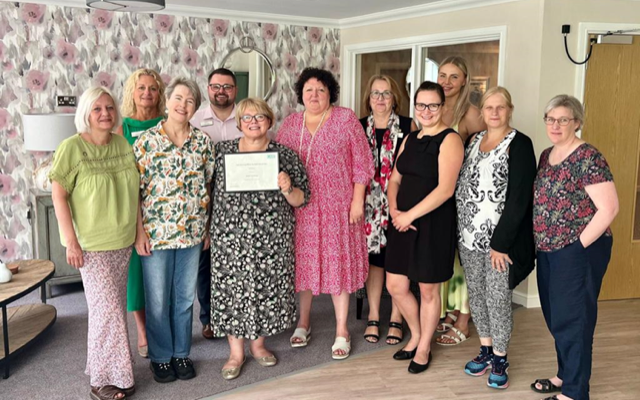Nurses graduate from care home programme

The Berkley Nurse Leadership programme, which has introduced 12-month training course aimed at improving the standard of nursing in care homes saw its first cohort of nurses graduate at an awarding ceremony on 28 June.
Launched in July last year, the Berkley Nurse Standards of Practice and Education programme was introduced by Berkley Care Group, owned by the European care group Clariane.
The course, which is offered to all of Berkley’s nursing staff, is aligned with the Standards in Practice and Education for care home nurses developed by the Queen’s Nursing Institute and supports the move towards Specialist Practitioner Qualification status for registered nurses working in adult social care.
The awarding ceremony saw eight graduates receive a certificate from Professor Deborah Sturdy, chief nurse for adult social care.
In addition, the group were awarded a Chief Nursing Officer Adult Social Care Team Award by Sturdy.
With nursing today being a degree-based profession, the concept of the programme, instigated by Louise Atherton, head of quality and risk for the Berkley Care Group was for it to be accessible for all RNs, including newly qualified, internationally recruited as well as nurses with years of experience.
Upon completion of the programme, nurses become part of the clinical governance group within Berkley and can explore additional career pathways within the group, with the potential to develop advanced practitioner skills or further hone their leadership skills. This could see nurses that have completed the programme filling future general and clinical manager roles across Berkley’s portfolio of homes or becoming part of the wider quality team across the Berkley homes.
The programme was developed in partnership with Charlotte Fry, independent nurse consultant, RN, district nurse, and Queen’s nurse who has extensive experience in care home and social care nursing. The programme took the nurses through four key areas of their work: accountability and professionalism; clinical care skills; leadership and management; and the ability to take research and apply it to practice.
Evidence of the nurse’s work was then gathered in part from their day-to-day workplace practice with the support of a workplace mentor, as well as face-to-face training for clinical skills, following which nurses had to demonstrate their competency of these skills before being signed off on them.
Nurses also attended four practice supervision days facilitated by Atherton and Fry to support them in developing their portfolio of evidence of professional practice.



